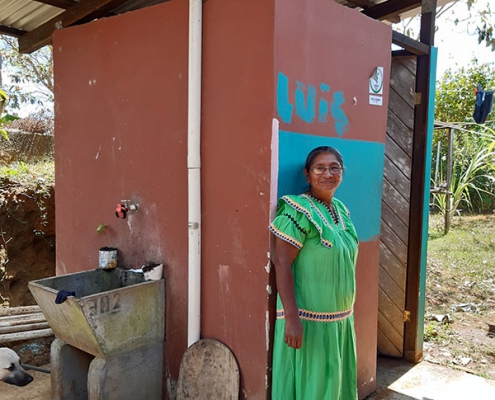Panama

Although Panama presents itself as a country with a high human development index, it still has very significant gaps in the coverage of water and sanitation services, especially in the indigenous comarcas, where there is great regional inequality. Ninety-one per cent of the indigenous population of the Ngäbe-Buglé Comarca suffers from extreme poverty. The gap is particularly relevant in the provision of sanitation services in rural areas, where the coverage of basic services reaches only 64% of the population. Due to this deficiency, diarrhoeal diseases are the third leading cause of mortality among children under five years of age.
With regard to Spanish Cooperation’s water interventions, two programmes are being implemented to improve access to water and sanitation in indigenous and rural areas in the east (multilateral portfolio) and west of the country (bilateral portfolio). The main objective of both programmes is to improve access to water and sanitation in indigenous and rural areas through the construction of water and sanitation systems, their community management and the promotion of local development plans with the strengthening of the sector’s institutions. They have a combined budget of more than 20 million euros, just over 10 million of which are donations from Spain, and include strategic components for the sustainability of the services implemented.
These programmes also pay special attention to the gender component, incorporating strategies to improve and strengthen the role of women in the community. An example of the work carried out is the creation of the School for Women Leaders, focused on the training and empowerment of indigenous women leaders in intervention areas in the Ngäbe-Buglé region, with the aim of strengthening women’s participation in the Water and Sanitation Boards, as well as in other community decision-making spaces.
More information
At the end of 2020, the bilateral programme’s projects are currently in a vulnerable situation, given that the impact of the COVID-19 pandemic in Panama and the restrictions adopted as a health measure to combat it have made it impossible to make the expected progress in the implementation of the projects’ water and sanitation infrastructure, as well as in the rest of the programme components (institutional, community) and in activities concerning cross-cutting issues (health, gender, climate change, multiculturalism).
In this bilateral programme, only one of the four batches of tendered projects has been completed. This is the Chichica-Las Lajitas project, where a gravity-fed drinking water system has been built that has improved supply to the beneficiary rural communities in terms of supply, service time (24h), quality and storage. The operator has also been strengthened in the operation and maintenance of the systems. The project also built 325 individual sanitation units and two school units. With regard to the multilateral portfolio together with the Inter-American Development Bank, progress of the works has been irregular, due to the increase in COVID-19 cases, as access has been made difficult by the sanitary confinements. Due to the stalled implementation, the programme has been granted an extension until 30 June 2021.
The institutional strengthening activities of the Rural Water Management Boards (Juntas Administradoras de Agua Rural – JAAR) are being implemented and, although with a longer timeframe, the gender plan continues to be implemented with the desired development of schools for women water leaders.
Likewise, and as part of the strategic support and technical assistance for the development of the water and sanitation sector in Panama, in 2018 the new Programme for the Participatory Preparation and Dissemination of the “National Guide for the Selection of Wastewater Treatment Technologies” was also approved, the general objective of which is to support the implementation of the National Drinking Water and Sanitation Policy for the Republic of Panama 2019-2030. However, this project has also been delayed due to the pandemic.

